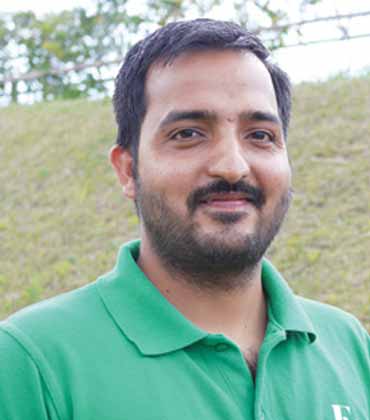In an era where the agricultural industry is actively embracing sustainable practices, there are numerous innovations on the rise to combat climate change and address global agricultural challenges. A notable example is the use of conventional synthetic polymers that play an important role in irrigation and water distribution. Despite their advantages, they often contain chemicals, like acrylic acid and acrylamide, that have detrimental effects on soil fertility and the environment.
EF Polymer KK, an agri-biotech company, overcomes these hazards with its ground-breaking solution—a 100 percent organic superabsorbent polymer (SAP).
“We offer an eco-friendly solution by recycling biowaste and converting it into an organic, biodegradable polymer through a patented process,” says Narayan Lal Gurjar, founder and CEO of EF Polymer.
After extracting pectin from biowastes, such as orange and banana peels, EF Polymer applies its patented technology to polymerize the materials into an organic SAP. When applied to soil, the SAP causes strong bonds to form between soil particles, which improves the soil water retention capacity. This can help farmers reduce water consumption by up to 40 percent, increasing irrigation intervals and sustainably enhancing crop production.
In addition, EF Polymer’s SAP can reduce fertilizer consumption by 20 percent by improving fertilizer retention in the soil and preventing it from running off. This innovative product has been attracting a great deal of attention from farmers around the world as many are suffering from the recent sharp rise in fertilizer prices.
With climate change on the rise, regions that were once abundant in water are now encountering drought conditions.
For example, California and the Midwest of the U.S. were recently hit hard by historical droughts. Southern Europe is also facing a severe water shortage.
EF Polymer’s SAP can absorb up to 100 times its weight in water. In agricultural settings, its use can improve soil conditions and help to enhance crop survival in areas that experience water scarcity or erratic rainfall. At the same time, it reduces irrigation frequency from six times a month to three, saving farmers’ time that can be used for other incomegenerating activities.
The SAP can be applied directly to the soil by mixing it with seeds during sowing or by combining it with fertilizers. It has played a vital role in alleviating the situations faced by farmers in droughtaffected regions of Uttar Pradesh, India. For instance, a wheat farmer started using the product in 2020. To assess its effectiveness, she divided her field equally, applying it to one half. During the first cycle of irrigation, she was able to provide water to both sections. However, due to water scarcity, she struggled to secure timely irrigation for the second round.
In areas where the product was not used, issues resulted in significant crop reduction, with 30 to 40 percent of the crop failing to germinate properly. In contrast, the section where it was applied exhibited excellent germination and improved overall yield. Encouraged by these results, she continued using the product for different crops.
Similar success stories have emerged from various parts of India, particularly among small-scale farmers who previously faced challenges in managing irrigation.
EF Polymer’s SAP has also proven to be effective in improving tomato production in sandy soils in the U.S. Commercial tomato farmers have experienced yield improvement of 10 to 15 percent despite challenging water conditions. Such positive outcomes have also been observed in Portugal for tomato production, as well as for carrot and sugarcane farming in Japan and Thailand.
In multiple countries, EF Polymer’s SAP has given hope to farmers by helping them increase yields and bringing sustainability to the fore. To this day, the company has sold over 100 metric tons of its organic polymer, mainly in the U.S., India, and Japan and has helped more than 12,000 farmers around the globe. EF Polymer aims to expand its business in the priority markets of the U.S., France, Thailand, India, and Japan.
Surpassing the limitations of petroleum-derived polymers, EF Polymer’s innovation consistently delivers positive results in various climatic conditions. Through this organic product, EF Polymer presents farmers a viable solution to enhance crop productivity, mitigate environmental impact, and secure a sustainable future.
EF Polymer KK, an agri-biotech company, overcomes these hazards with its ground-breaking solution—a 100 percent organic superabsorbent polymer (SAP).
“We offer an eco-friendly solution by recycling biowaste and converting it into an organic, biodegradable polymer through a patented process,” says Narayan Lal Gurjar, founder and CEO of EF Polymer.
After extracting pectin from biowastes, such as orange and banana peels, EF Polymer applies its patented technology to polymerize the materials into an organic SAP. When applied to soil, the SAP causes strong bonds to form between soil particles, which improves the soil water retention capacity. This can help farmers reduce water consumption by up to 40 percent, increasing irrigation intervals and sustainably enhancing crop production.
In addition, EF Polymer’s SAP can reduce fertilizer consumption by 20 percent by improving fertilizer retention in the soil and preventing it from running off. This innovative product has been attracting a great deal of attention from farmers around the world as many are suffering from the recent sharp rise in fertilizer prices.
With climate change on the rise, regions that were once abundant in water are now encountering drought conditions.
We offer a 100 percent biodegradable and organic solution by recycling biowaste and converting it into an organic polymer through a patented process
EF Polymer’s SAP can absorb up to 100 times its weight in water. In agricultural settings, its use can improve soil conditions and help to enhance crop survival in areas that experience water scarcity or erratic rainfall. At the same time, it reduces irrigation frequency from six times a month to three, saving farmers’ time that can be used for other incomegenerating activities.
The SAP can be applied directly to the soil by mixing it with seeds during sowing or by combining it with fertilizers. It has played a vital role in alleviating the situations faced by farmers in droughtaffected regions of Uttar Pradesh, India. For instance, a wheat farmer started using the product in 2020. To assess its effectiveness, she divided her field equally, applying it to one half. During the first cycle of irrigation, she was able to provide water to both sections. However, due to water scarcity, she struggled to secure timely irrigation for the second round.
In areas where the product was not used, issues resulted in significant crop reduction, with 30 to 40 percent of the crop failing to germinate properly. In contrast, the section where it was applied exhibited excellent germination and improved overall yield. Encouraged by these results, she continued using the product for different crops.
Similar success stories have emerged from various parts of India, particularly among small-scale farmers who previously faced challenges in managing irrigation.
EF Polymer’s SAP has also proven to be effective in improving tomato production in sandy soils in the U.S. Commercial tomato farmers have experienced yield improvement of 10 to 15 percent despite challenging water conditions. Such positive outcomes have also been observed in Portugal for tomato production, as well as for carrot and sugarcane farming in Japan and Thailand.
In multiple countries, EF Polymer’s SAP has given hope to farmers by helping them increase yields and bringing sustainability to the fore. To this day, the company has sold over 100 metric tons of its organic polymer, mainly in the U.S., India, and Japan and has helped more than 12,000 farmers around the globe. EF Polymer aims to expand its business in the priority markets of the U.S., France, Thailand, India, and Japan.
Surpassing the limitations of petroleum-derived polymers, EF Polymer’s innovation consistently delivers positive results in various climatic conditions. Through this organic product, EF Polymer presents farmers a viable solution to enhance crop productivity, mitigate environmental impact, and secure a sustainable future.
Thank you for Subscribing to Agri Business Review Weekly Brief



